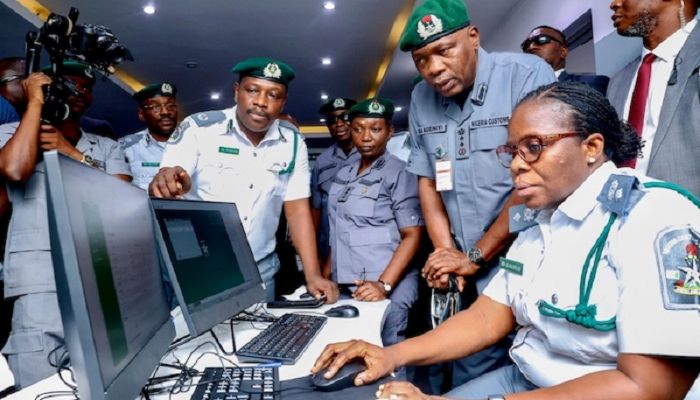Customs’ B’Odogwu Digital Platform Faces Acid Test Run at Ports: Stakeholders Rally for Seamless Maritime Trade

The Nigeria Customs Service (NCS) has doubled down on its ambitious digital transformation agenda, engaging stakeholders at the Ports & Terminal Multiservices Ltd. (PTML) command to address emerging hitches around the B’Odogwu customs processing platform, a homegrown innovation designed to streamline cargo clearance and elevate trade efficiency.
At a two-day strategic engagement session in Lagos, Comptroller Tenny Daniyan, Customs Area Controller for PTML, led the second phase of B’Odogwu Stakeholder Re-sensitisation, reinforcing the platform’s role as the Unified Customs Management System (UCMS) built indigenously by the NCS ICT team.
Launched in October 2024 by Comptroller-General of Customs, Bashir Adewale Adeniyi, B’Odogwu Digital Platform—an acronym derived from “Borders and Customs Operations”—is positioned as the flagship engine for digital integration across Nigeria’s ports, land borders, and airports.
“This platform is not just software—it is the backbone of Customs’ innovation playbook, aimed at compressing cargo processing time, automating compliance, and facilitating real-time documentation,” Comptroller Daniyan told participants.
From Pilot to Performance: The PTML Testbed
The PTML Command serves as the pilot command for B’Odogwu, having recorded its first successful single goods declaration and payment as far back as November 2024. The system preloads essential data such as Form M, bank codes, and shipment details, thus reducing human error, paperwork delays, and processing bottlenecks.
Assistant Comptroller Abass Oladepo, the B’Odogwu Project Manager at PTML, reaffirmed NCS’ focus on 24-hour port operations, with an ambitious two-hour cargo clearance target already yielding results—PTML reportedly achieves average clearance times under six hours.
Oladepo also cited an April 2025 endorsement letter from the Central Bank of Nigeria (CBN), which now legitimises B’Odogwu as a permanent portal for generating Form M and Pre-Arrival Assessment Reports (PAAR).
“We are consolidating and innovating at the same time. But we need stakeholders to file accurate, honest declarations. Avoid duplication. Avoid cutting corners,” Oladepo said, echoing the Customs CG’s “Consolidate, Collaborate, Innovate” reform mantra.
Stakeholders Rally, Highlight Wins and Weak Links
Stakeholder groups applauded Customs for driving digitisation with an indigenous platform, even as they flagged lingering technical issues:
- Alhaji Sulaimon Ayokunle, Secretary of ANLCA (PTML Chapter), praised the initiative as a leap forward from the foreign-built NICIS II, urging full migration of other Customs commands to B’Odogwu.
- Mr Afeez Balogun, Clearing Manager, TDI Group, confirmed cost reductions and cargo turnaround improvements, but flagged glitches such as non-availability of “PTML” as a valid port of discharge option.
- Mrs Chibuzo Okonkwo, ED of Muchis Chamars Ltd., highlighted improved cargo handling and reduced demurrage, but called for stakeholders to avoid abnormal filings and respect digital workflow standards.
Stakeholders also urged Customs to improve power supply and connectivity infrastructure within command locations to maximise system uptime and user confidence.
BRANDECONOMY Insight: Building Nigeria’s Digital Maritime Corridor
As Africa’s largest economy struggles with port congestion, trade leakages, and revenue shortfalls, B’Odogwu represents a bold localised leap into the digitised future of customs and logistics. Unlike imported digital solutions that often fail to capture local realities, B’Odogwu is tailored, scalable, and symbolic of Nigeria’s evolving capacity to solve its own infrastructure gaps.
If effectively optimised and expanded nationwide, B’Odogwu could become the core enabler of Nigeria’s blue economy strategy, while also reducing corruption loopholes, standardising procedures, and improving ease of doing business in ports.
Bottom Line:
B’Odogwu isn’t just a Customs platform—it’s Nigeria’s declaration of digital sovereignty in trade logistics. The challenge now lies in refining, scaling, and sustaining the gains across all entry points.












